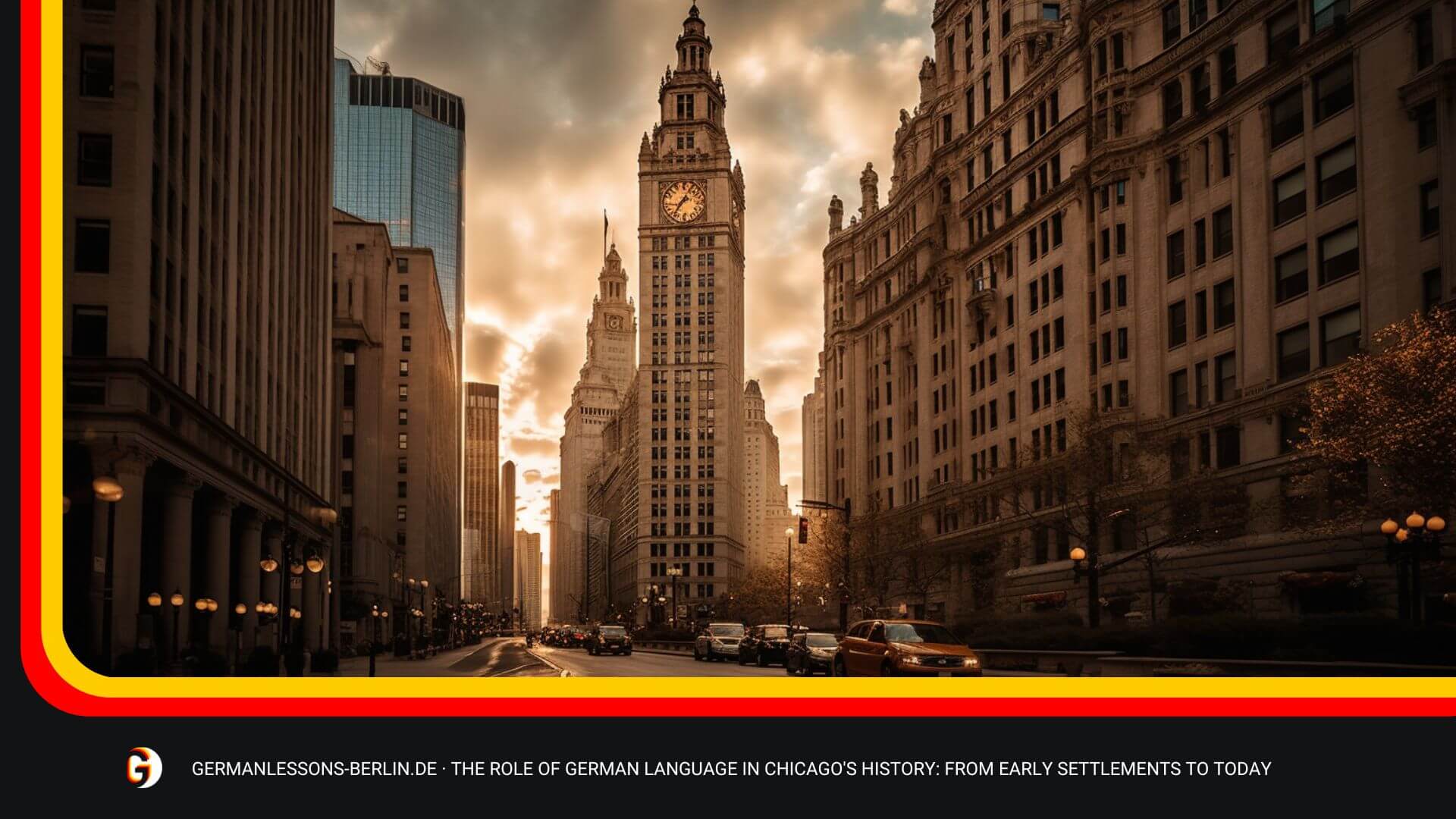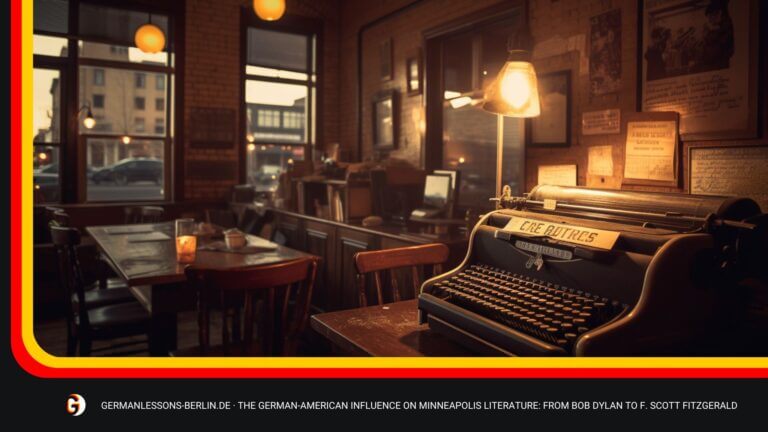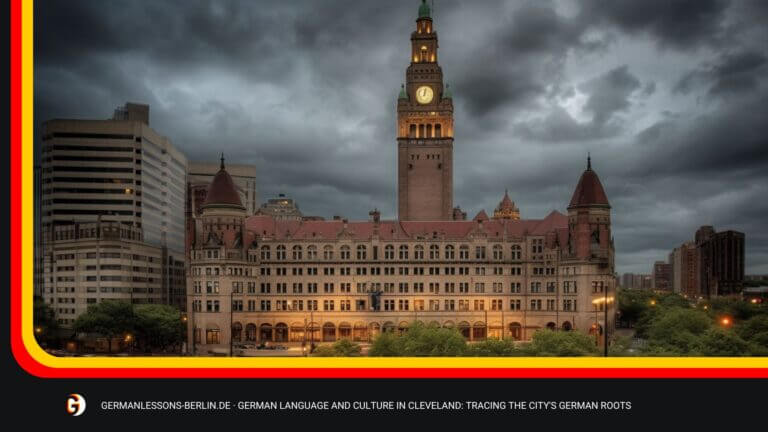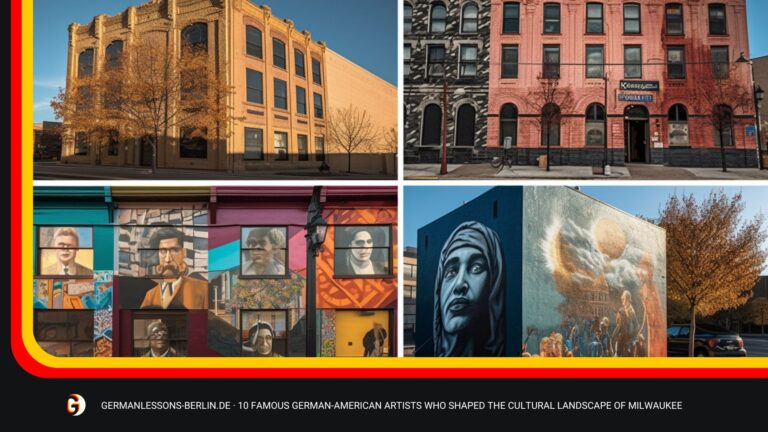The German language has played an integral role in the history of Chicago since its earliest days. From early settlements to today, it is evident that German-speaking immigrants have left their mark on the city and its inhabitants. Weaving through the fabric of local culture, this rich linguistic heritage continues to be celebrated by generations of speakers who honor the memory of those who came before them. In this article, I will examine how the German language shaped the cultural landscape of Chicago from early settlement to the present day.
For centuries, Germany has been a significant source of immigration for many American cities, including Chicago. As far back as 1844, when Johann Schackel arrived with his family aboard The Lexington Ship and settled on Goose Island, Germans began coming in droves seeking economic opportunities and new beginnings. While these first settlers faced discrimination due to their foreign backgrounds, they persevered and worked hard to create a vibrant community centered around their shared language and culture.
Today, more than 452 thousand people live in metropolitan Chicago who identifies as having some form of German ancestry – making up about 8% of the total population! Even though much time has passed since those first settlers made landfall at Goose Island, their influence can still be felt throughout modern-day Chicago – from street names paying homage to prominent figures like Carl Sandburg or Hermann von Bergen; to popular dishes such as bratwurst, all the way down to everyday conversations taking place between locals speaking High German and Low German dialects alike.
Table of Contents
History Of German Immigration To Chicago
German immigrants have played an integral role in the history of Chicago, from its earliest settlements to today. German settlers first arrived in the area during the late 1700s and early 1800s, bringing their distinct culture and language. This influx of new people dramatically affected Chicago’s population growth and cultural identity. As these early settlements grew into what is now known as Chicago, so too did the influence of the German language. Most German immigrants spoke English and German but mainly used German for everyday conversations.
German was not limited to just conversation; it also became part of Chicago’s educational system. In 1855, two bilingual schools were established that simultaneously taught English and German languages. Later in 1886, a third school was opened, which focused solely on teaching students only the german language. This allowed many students who could not speak English fluently to still receive quality education despite any language barrier they may face.
Numerous efforts are underway to revitalize the presence of the German language throughout all aspects of life within Chicago. For example, organizations such as ‘The Chicago Language Initiative’ offer free classes where people can learn how to read, write and converse in german while also exploring some of its rich cultural traditions like music or dance. There are even special events celebrating German heritage, such as Oktoberfest, held annually in September at Daley Plaza, where attendees can enjoy various traditional dishes accompanied by different types of beer imported from Germany! Through initiatives like this, we see how far german has come since its initial arrival in Chicago over 200 years ago – it has become an essential part of our city’s history. It will continue to be so for generations to come.
Importance Of German Language In The City
The German language has been integral to Chicago’s history since early settlements. The influx of German immigrants in the mid-1800s brought a rich culture and language that would shape the city for generations. Through their contributions, they provided meaningful opportunities for education and employment and enriched many aspects of life in Windy City.
The importance of the German language was evident from the start when schools began offering instruction in both English and German languages. This allowed children whose parents spoke only German to learn in their native tongue while still being able to understand what was being taught in English classes. In addition, numerous newspapers were published in German, keeping readers informed about local news and events.
Today, over 100 years later, the influence of the German language can still be felt throughout Chicago. It is estimated that around one million people living in the city are descended from those original settlers who made it their home so long ago. These individuals continue to take pride in preserving their cultural heritage and seek ways to celebrate its accomplishments by attending festivals or participating in other activities related to Germany’s rich past. Furthermore, organizations are dedicated to teaching future generations about this unique aspect of the area’s history through educational programs such as lectures, exhibitions, theater performances, and more.
It is clear that despite its humble beginnings, the German language has profoundly impacted Chicago throughout its evolution into becoming one of America’s most vibrant cities today, providing essential resources for members of its community and helping spread knowledge about its unique roots along the way.
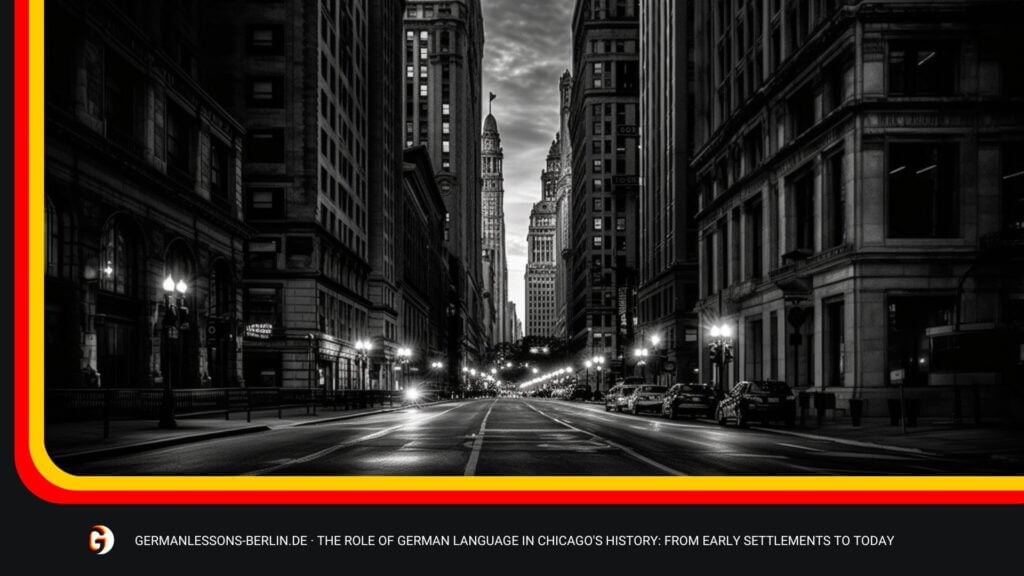
Impact Of The German Language On Education
The influence of the German language in Chicago’s history is profound. It has substantially impacted education throughout the city and beyond from early settlements to today. This section will examine the importance of the German language in educational environments, historically and presently.
Regarding education during earlier periods, German was one of several languages used to teach students from different cultural backgrounds. Throughout the 19th century, many schools offered instruction in multiple foreign languages, including English, French, Latin, Greek, and German. As such, those who spoke primarily German could receive appropriate schooling while still learning their native tongue. In this way, they could remain connected with their homeland culture and language even if they lived abroad in a new country like America. Additionally, knowledge of more than one language enabled them to communicate effectively with others regardless of their mother tongue or background — which remains equally important today.
Within modern-day society, there are numerous opportunities for individuals looking to pursue further studies in the German language within Chicago itself. The University of Illinois at Chicago offers courses ranging from introductory conversation classes to advanced literature seminars taught solely in German; these can be taken by anyone hoping to gain a better understanding or expand upon existing skill sets related to this particular language. Furthermore, various after-school programs are available where children can learn essential conversational elements through play activities designed specifically for younger learners – helping them become confident speakers from an early age.
Ultimately then, it is clear that Germany’s influence on education here in Chicago extends far beyond its initial settlement period over two centuries ago; its presence continues strongly into our present-day lives due to how accessible its teaching methods have become across all aspects of academia — making sure that no matter your cultural origin or previous experience with foreign tongues you stand a chance at gaining proficiency should you so choose. With efforts being made towards creating even more educational outlets dedicated to studying this sometimes forgotten yet incredibly diverse language, it appears a safe bet that we’ll continue seeing its positive effects long into future generations too.
How German Culture Influenced Music, Art, And Cuisine In The City
German culture has undoubtedly left its mark on Chicago’s history. In the area of music, German influence can be found in the city’s numerous marching bands and polka groups. Many of these musical ensembles have been around since the early days of settlement when immigrants were eager to bring their customs. Over time, this German-music-Chicago style evolved into a unique blend of traditional sounds with more modern influences.
The impact of German culture can also be seen in art and cuisine throughout Chicago. From classical paintings depicting rural life in Germany to delicious bratwursts served at street markets, there is no denying that German-art-Chicago and German-cuisine-Chicago have made an indelible impression on the city’s cultural landscape. Even today, visitors from all over come to experience authentic dishes like schnitzels or roulade and marvel at works by some of the city’s most talented artists who draw inspiration from German heritage.
The presence and influence of German culture in Chicago are undeniable and continue to shape how we view our past while informing how we live our lives today. Whether it is through music, art, or food – there are countless examples of how German culture in Chicago has influenced everything from popular entertainment to public policy decisions and beyond – making it impossible to ignore its profound impact upon society both then and now.
Contributions Of Germans To Politics And Business In Chicago
From the earliest days of Chicago’s settlement to the present day, Germans have left their mark on the city in many ways. Today, German contributions to politics and business are still felt throughout Windy City. Here is an overview of some of these significant contributions:
- German Politicians: Since 1837, when John Wentworth was elected mayor of Chicago, Germans have been essential members of the local political sphere. Notable German politicians from Chicago include William Ebersold (1928-29), Anton Cermak (1931-33), and Edward J. Kelly (1933-47). These individuals served with distinction while advocating for many policies that continue to shape the city today.
- German Businesses: The impact of German businesses on Chicago has been significant since the early 1800s – particularly within the printing and brewing industries. Most notably, Frederick Pabst founded one of America’s largest breweries in 1889 near Milwaukee Avenue; it later became known as Pabst Brewing Company. In addition, Julius Meinl established a successful grocery store chain that continues to serve customers across Chicagoland today!
- Chicago Politics & Business: Over time, Germans played influential roles in politics and business throughout Chicago. For example, Carl Hanssen was appointed Superintendent of Public Works in 1933 during Mayor Edward J. Kelly’s term – implementing several infrastructure projects that remain vital to this day, such as Lake Shore Drive renovation and construction along Ogden Avenue Corridor. Additionally, prominent developer Paul Schwendener helped construct numerous buildings, including Tribune Tower and Merchandise Mart!
In sum, German immigrants have impacted Chicago for over two centuries, shaping its culture through music, art, and cuisine and contributing significantly to its politics and business landscape. Through hard work and dedication, they have made invaluable contributions toward making our city what it is today!
Popularity Of German Language Newspapers And Publications
For many German immigrants to Chicago, the language of their homeland was a source of comfort and connection. As such, it is unsurprising that German-language newspapers and publications were popular in the city from their earliest days. Indeed, by 1855 there were five major German-language papers published in Chicago. These newspapers covered everything from politics to culture to everyday life for their readers. These papers’ popularity grew as more Germans settled in the city.
The proliferation of German-language papers in Chicago had a stimulating effect on English-speaking citizens too. To compete with other articles and gain readership, some English-speaking publishers began producing bilingual editions of their papers featured in English and German! This strategy proved successful and allowed them to capture a more significant portion of the market share than they could have otherwise. While most German-language publications eventually declined during World War I due to hostility towards anything perceived as “German” at the time, this practice still exists today amongst some Chicagoan media outlets, offering bilingual articles or sections so that all members of the community can stay informed about current events regardless of what language they speak.
Though times may have changed since early settlement days, one thing has remained constant: Germany remains an integral part of Chicago’s history and identity, evidenced by its ongoing presence within local newspapers and publications.
Preservation Of Traditional German Culture In The City
The German-American heritage of Chicago is a long and intricate history. From early settlements to today, it has been a crucial part of the city’s development and identity. Even in the 21st century, many traces of traditional German culture can be found throughout Chicago.
One of the most obvious signs is the presence of German-style architecture still standing in specific neighborhoods. Characteristic features such as high-pitched roofs, decorative ornamentation on facades, and symmetrical layouts are all common elements in these buildings. They provide an insight into what life was like for settlers from Germany during this period and serve as reminders of their hard work and dedication.
In addition to architecture, Germans have shaped other aspects of day-to-day life in Chicago over time through festivals, cuisine, music, and more. Traditional German festivals such as Oktoberfest remain popular events with people coming together to celebrate their shared heritage. Similarly, dishes such as bratwurst and sauerkraut continue to influence local eateries, while folk songs passed down generations evoke nostalgia within those who grew up surrounded by its cultural significance.
| German-Style Architecture | Festivals | Cuisine | Music | |
|---|---|---|---|---|
| Presence | Still Standing | Oktoberfest & Others | Bratwurst & Sauerkraut | Folk Songs Passed Down Generations |
Decline Of German Language Usage Over Time
German language usage in Chicago has gradually declined over the years. In early settlements, German was widely spoken and influenced the city’s culture and identity. However, it is now considered a minority language due to various factors that have caused its demise. Below are some points which demonstrate how German-language usage has decreased:
- Language Shift: Over time, many people of German descent living in Chicago shifted towards speaking English as their primary language for communication purposes. This meant fewer people were using or passing down the German language from generation to generation, leading to a decrease in its overall use.
- Lack of Education Opportunities: While there were once schools where children could learn both English and German in 19th century Chicago, these opportunities declined over time due to a lack of funding and interest by parents. As such, there were fewer chances for people within the community to become fluent speakers of the language.
- Government Restrictions: Government policies also played a role in limiting the amount of German being used throughout the city, including restrictions placed on political meetings and speeches given in languages other than English during the World War I era.
- Immigration Patterns: The population shifts experienced by Chicago’s immigrant groups also contributed to declining German-language usage among specific communities as some ethnic Germans moved away from or into new neighborhoods with different linguistic backgrounds.
In light of all this evidence, it is clear that there has been a significant drop in the number of individuals who speak German fluently or regularly in today’s day and age compared to previous centuries when it was much more prevalent amongst settlers and natives alike – thus indicating a strong trend toward language shift and decline across generations here in Chicago.
Revitalization Efforts For The Language
The German language has a long and rich history in Chicago, from its early days as an immigrant destination. As time passed, however, the use of the German language diminished due to assimilation practices within American society. In recent years, various efforts have been made to revive the language among current generations of Chicagoans.
Additionally, numerous organizations are now offering courses for adults who wish to reconnect with their family’s linguistic roots or better understand another culture. One such effort is the introduction of German language classes into elementary schools throughout Chicago. These classes offer students an opportunity to learn about their cultural heritage through learning the language that was once spoken by many past generations.
On top of these educational initiatives, there has also been a surge in the popularity of social activities that promote the German language and its associated cultures. Examples include regular meetups hosted at local pubs where those interested can practice their conversational skills with one another; theater performances featuring plays written entirely in German; annual festivals which celebrate traditional Bavarian cuisine and music; and even Deutsche clubs dedicated exclusively to keeping alive this vital part of Chicagoland’s history.
These revitalization efforts have done much over recent years to preserve not only Germany’s native tongue but also its distinct customs and traditions among today’s inhabitants of Chicago – something likely to continue far into the future if given enough attention and investment.
Current Status Of German Language In Chicago
In the present day, the German language still plays a significant role in Chicago’s history. The city is home to numerous german language schools and classes that serve as important centers of education and cultural revival. These educational institutions provide an environment for students to learn German and offer opportunities to experience the culture of Germany through events such as lectures, movie screenings, concerts, theater performances, and more.
The popularity of these institutions has grown significantly over the years, with many Chigacoans joining them each year. This phenomenon reflects a more significant trend toward the revival of interest in the German language and culture throughout Illinois, which now boasts nearly 400 thousand native or proficient speakers, according to recent estimates. Furthermore, Oktoberfest celebrations have become increasingly popular every year due to their ability to bring out the best aspects of American and German cultures together in one event.
These trends demonstrate that while much has changed since early settlements, there are still strong ties between Chicago and its German heritage. As long as initiatives such as those seen at local german language schools continue to foster an appreciation for this influential piece of history, it will remain a vibrant part of our collective identity for generations to come.
Frequently Asked Questions
What Role Did German Immigrants Play In The Development Of The City Of Chicago?
The role of German immigrants in the development of Chicago is essential. These individuals have left a lasting mark on the city and its culture from early settlements to today. Their presence has helped shape the city’s identity and provided unique opportunities for language preservation.
In their earliest days in the city, German immigrants brought with them many aspects of their own culture that had been developed hundreds of years back home. This included foods, customs, and even languages they were accustomed to speaking at home. As they settled into life in America and, more specifically, in Chicago, they sought ways to preserve this cultural heritage while still adapting to the new environment around them. One way was through political organizations such as Turnverein groups or social clubs based on common interests shared by community members. Such activities allowed them to stay connected to their roots while contributing positively to society by participating in civic engagement initiatives like creating public parks or raising funds for charitable causes related to education or health care.
Additionally, some German-speaking communities established churches where services would be conducted exclusively in German. These efforts served as a religious outlet and acted as a platform for preserving their native tongue among those who attended Sunday services each week. Furthermore, various publications, both printed and online, were dedicated solely to disseminating information about events occurring within local communities written entirely in German – furthering the cause of language preservation even today!
These are just some examples demonstrating how German immigrants played an integral part in developing what we know now as modern-day Chicago from its early beginnings up until present times, leaving behind a rich legacy that continues to influence our lives and will no doubt continue to do so well into future generations yet unseen too!
What Are The Similarities And Differences Between The German Language And Other Languages Spoken In Chicago?
The role of the German language in Chicago has been an exciting topic amongst historians, linguists, and other scholars. What are the similarities and differences between German and other languages spoken in Chicago? We must first examine how its presence has evolved to answer this question.
German immigrants have profoundly impacted the city since early settlements arrived in what is now known as Chicago. Many place names in the town were derived from the German language, such as ‘Wicker Park,’ ‘Lincoln Square,’ or ‘Goethe Street,’ to name just a few. The influence of German can still be seen today, with some words being adopted into everyday English usage; for example, “kindergarten,” which means “children’s garden.”
Though there are numerous similarities between German-English, German-Polish, German-Spanish, German-Italian, and even German-French, there are also distinct differences when compared to these other languages:
– First, each of these languages tends to vary drastically in terms of pronunciation; for instance, French speakers often accentuate their syllables differently than someone who speaks Spanish might do so.
– Secondly, syntaxes differ greatly depending on which language one speaks; while some may use more complex sentence structures, others may opt for simpler ones.
– Thirdly, vocabulary will naturally differ, too, due to cultural influences that shape what kind of words people use in different regions. Lastly, grammar rules are only sometimes universal either – some languages allow specific constructions that would sound utterly wrong if used by another speaker.
These various distinctions demonstrate why it is vital to understand all aspects of a particular language before attempting any translation or interpretation task. As one delves deeper into the richness of each culture associated with Chicago’s varied linguistic landscape, one becomes increasingly aware of both commonalities shared across multiple tongues as well as unique characteristics exclusive only to them – culminating in a greater appreciation for our diverse history here in America’s third largest city.
How Does The German Language Compare To Other Languages In Terms Of Usage In Chicago Today?
To answer this question, one must consider the prevalence and use patterns of the German language compared to those of other languages spoken in Chicago.
Firstly, it is essential to note that the German language has been used in Chicago since its earliest days as a settlement. Its influence can be seen throughout history with many prominent figures in the city of German descent, such as Carl Sandburg and Frank Lloyd Wright. Furthermore, there were multiple areas settled by Germans during this period which allowed for their language and culture to spread across the region.
However, when looking at modern-day usage patterns of the German language, it is clear that while still present, it pales in comparison to some other languages spoken in Chicago today. This may be due to an influx of immigrants from countries like Mexico and Poland who have brought their respective languages into the city over time. Additionally, English remains dominant among most inhabitants regardless of heritage or background – making it difficult for any other language to compete with its widespread usage.
To gain an understanding of how these different languages relate to each other within Chicago today, we must examine the following:
– The prevalence and importance placed on different languages depending on age group/demographic;
– Usage pattern comparisons between native speakers versus second-language learners;
– Variations between informal vs. formal contexts regarding accepted speech norms;
– Comparisons between regional dialects amongst various linguistic communities living in proximity within the city;
– How cultural identity impacts one’s choice of words/phrases when communicating verbally or through writing based upon personal preference.
Studying all aspects related to modern-day usage patterns of both German and other languages spoken in Chicago will help us form a clearer picture of what role each plays within society today and how they shape our understanding of intercultural communication around us every day.
What Types Of Activities Are Available To Promote The Preservation Of The German Language In Chicago?
The German language has had a significant presence in the history of Chicago, from early settlements to today. What types of activities are available for preserving this influence? There are various initiatives ranging from german-language courses and classes to meetups and festivals aiming to celebrate Germany’s rich cultural offerings.
German-language courses are one way to promote the preservation of the language in Chicago. These programs allow students to learn about grammatical structures and understand the culture associated with speaking them. Additionally, these courses use interactive activities such as role-playing, reading aloud, and writing exercises to help build proficiency among participants. Furthermore, there is often a particular emphasis on pronunciation so that learners can create proper connections between themselves and those who have spoken German throughout history.
For those looking for more informal ways to engage with the language, there are various social groups dedicated to promoting German culture through events such as german-language clubs, german-language classes, and even german-language meetups. Here individuals can come together to practice their linguistic skills while enjoying traditional foods or engaging in conversations related to interesting topics. Moreover, these gatherings provide an excellent platform for networking amongst other enthusiasts who share similar interests when it comes to learning or studying the language.
In addition, many cities across North America host annual celebrations known as “german-language festivals,” which bring people from all walks of life together under one roof for one common purpose – celebrating German heritage! Events like these feature performances by musicians singing popular songs in both English and German; theatrical presentations exploring different aspects of its culture; art exhibitions showcasing works inspired by famous artists from the region; educational seminars featuring speakers discussing topics related to linguistics; and much more. All these activities provide attendees with an immersive experience where they can immerse themselves in Germany’s culture without ever leaving home! No matter what method suits them best, there are plenty of opportunities for anyone interested in gaining insight into Germany’s past or present-day contributions through its beloved language. With options like taking courses or attending festivities devoted solely to fostering an appreciation of this unique tongue, it becomes accessible to everyone regardless of background or level of expertise!
What Unique Features Of The German Language Have Been Embraced By The Chicago Community?
German Americans have long been a part of the Chicago community, and their language has significantly impacted its culture. German Chicagoans have embraced certain features of the German language that are unique to their heritage and identity. From spelling variations to different grammar rules, these unique elements give German speakers in the city an advantage when communicating with each other or expressing themselves through writing.
The evolution of the German language in Chicago can be traced back centuries to early settlement patterns and communities formed by German immigrants. These communities were often centered around churches, taverns, and social clubs—all places where people could gather to speak their native tongue. Even today, many families still pass down traditions from generation to generation that involve speaking or reading in German.
The use of German is crucial for preserving one’s cultural identity because it allows individuals to express themselves authentically even while living far away from the country they originally came from. The intricate nature of this language brings a sense of pride and camaraderie among those with similar backgrounds. It also serves as an anchor for understanding their past and connecting them to their roots. For all these reasons, it’s clear why German culture and heritage remain strong within the city limits of Chicago despite being separated by time and distance from its origins in Germany.
Conclusion
The German language has been an integral part of Chicago’s history, from the early settlements to today. It has had a lasting impact on the city and its culture, as well as influencing other languages spoken in Chicago. Even though English is now the primary language of communication in Chicago, many people still use German phrases or words when talking with friends and family members who are familiar with it. Furthermore, numerous activities help keep the German language alive in the city, like events such as Guten Tag Fest and various school programs that offer classes for students interested in learning more about it.
I believe that if we continue to work together towards preserving this vital aspect of our cultural heritage, we can ensure that future generations will be able to appreciate the unique features of the German language, which have become so integrated into Chicago’s history and identity over time. By promoting initiatives such as those mentioned above, we can do our part to guarantee that future generations will also be able to enjoy all the benefits associated with being bilingual – something which I am sure would make proud not only every Chicagoan but also every german immigrant who chose this great city as their home.
Several external resources are available to learn more about the role of the German language in Chicago’s history. The DANK Haus German American Cultural Center, the German American Heritage Center, and the German American Chamber of Commerce of the Midwest are all organizations that celebrate and promote Chicago’s German-American heritage. Additionally, the Chicago Public Library offers several resources related to the German language and culture, including language-learning materials, books, and films. By exploring these resources, one can gain a deeper understanding of the historical and cultural significance of the German language in Chicago’s history.

